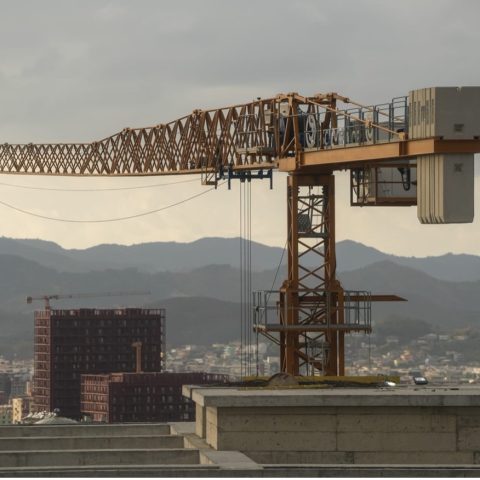A vast majority of Albanians, 86.5 percent, support the country’s EU membership bid, reveals annual survey by the Albanian Institute for International Studies. EU continues to lead list of strategic partners, closely followed by the United States.
The results of the latest annual Albanian Institute for International Studies survey on Albanians’ support for the country’s EU bid reveal that 86.5 percent of Albanians would definitely vote in favor of the accession of Albania in the European Union, while only 7 percent would cast their vote against it. The level of support has increased by 6 percentage points compared to last year and continues to be testimony to the fact that Albania has the largest support factor among perception of population in the region, the study’s authors note.
Moreover, for 57.5 percent of the respondents European integration is very important in their personal realm while for a third of the sample it is quite important but not a priority. Only 6 percent attach no importance to the process, representing a very minor category.
There is no dilemma over the fact that the high support for EU accession is first and foremost positive and should really encourage local politicians and political parties to make use of this support. A number of reforms, particularly economic ones might be very painful from the social side and yet the political elite in Albania have an almost unique chance to implement them while arguing that they are related to EU accession preparations. Similarly the support for EU project can be useful to many initiatives ad projects of the other actors in Albanian society including civil society think tanks, media and even religious communities.
This support should also be used properly by the European Union and its institutions as long as the EU is still committed to the enlargement process. EU membership has been the main driving force for Albanianstate reconstruction very similar to other countries in the region of Southeastern Europe which have been inspired by the same incentive. It is important to mention the fact that it has also served as a platform for constructing peace, fostering reconciliation and building trust among states in the Balkans, inclusive of Albania.
This peace and reconciliation project is still incomplete and finished in the Balkans and Albania, despite not having the negative experience of ethnic conflict which scarred ex- Yugoslav countries, still needs to come to terms with the past and make a clear break with those past features that do not belong to the foundations of European culture.
The EU can use this major support for integration in Albania, and in some other countries of the region equally interested to progress in their integration path, especially in the context of enlarging the European markets, in a backdrop of the severe economic and Euro zone crisis which seems that will take a considerable time before subsiding.
The reason why this major support for European integration might be ‘bad for the process’ relate mostly to a big misunderstanding related to the process of European integration.
This process continues to be perceived mostly as an external, foreign policy related one, as a relation with an outside actor rather than a transformative process for Albania itself. To illustrate this one can look at Albanian citizens’expectations regarding what they believe will follow (rather than precede) accession: free and fair elections, functioning justice system, less corruption, more rule of law, etc) All these issues are in fact preconditions and major structural problems which Albania needs to deal with well before accession can be made possible.
Hence, when reasons of support are considered the majority, 38 percent say that they expect the standards of living to rise while another 18 percent expects new job places. Around 13 percent expect either less corruption or more justice. The combination of the slowdown of economic growth at home with considerations of the crisis at large in Europe has influenced perception by putting economic concern and expectations at the forefront.
For 40 percent of the skeptics (those who would vote against) the primary reason is expected inflation while for slightly more than a quarter of them, risks to the Albanian identity are the reason for being against.
-Progress: fluctuating evaluations
Half the sample asked (49.1 percent) believes that Albania is not yet ready to join the EU while less than a third (30.1 percent) believe that indeed it is. One fifth of the respondents cannot give an answer to this question signaling confusion.
Albanians appear less strict when it comes to whether EU should grant Albanian membership despite its readiness. Hence 38 percent say it should not do so before Albania is ready but a very similar 37 .3 percent think that EU should accept Albania even before the latter is fully ready to join. Yet again a quarter of the sample does not answer this question.
When asked to asses the progress that Albania has achieved in its integration path compared to one year ago, the majority of the sample seems to believe that the progress have been either average or little.
While 13.4 percent believe the progress has been quite substantial and another 14.4 percent does not acknowledge any kind of progress, a combined 68 percent assesses the progress as somewhat or little.
Asked about their expectations for this particular year and the candidate status, Albanians were only very slightly on the optimistic side, 39.2 percent of them said that the answer on the candidate status was going to be positive (The questionnaire did not make any specifications about conditional status). A full third of the sample (33.5 percent) did not believe that Albania I was going to be granted the candidate status. The full correct answer of this question I gong to be revealed in December since the EC recommendations as been positive yet conditional. 27.2 could not answer this question, or said that they didn’t know.
40 percent of Albanians expect their accession year to the EU to be 2020, a date give quite frequently eve in past surveys. A very optimistic third of the sample expect unrealistically though the accession to happen in the following two years. 12 percent believe accession is going to happen after 2020 and 18 percent don’t know. The number of people who believe Albania is never going to become an EU member stat ahs decreased significantly from last year to an insignificant minor group (3 percent)
-Factors and institutions: from parties to the executive, the trip back to normalcy
Three main factors are singled out by around 40 percent of respondents attaching to each of them outmost importance when assessing their influence on the integration process itself and on its pace. Albanian politics (44 percent), Albanian Economy (40 percent) and Free and Fair Elections (41 percent) are on the top of the list in citizens’perceptions when asked about factors shaping European integration.
‘Free and Fair elections’ return to the agenda after last year being not mentioned so frequently. The approach of the electoral year has increased the sensitivity of the citizens towards the elections even before the EC set them up as a precondition for the opening of the accession negotiations.
The factors that are considered as less important to this process continue to be as in the previous eyras: the religious composition of the Albanian and the regional context, chosen by 14 and 13 percent each as very important factors.
When institutions are considered citizens seem to acknowledge the consensus reached between the main two political camps, stepping aside from the political crisis mode. Hence while last year citizens attached major importance to political parties as institutions for the European integration, this year 42.3 percent of them associate responsibility and importance where it belongs, to the executive hence the government. 21 percent pick the Parliament as the most important institution while only 18 percent continue to hold the opinion that political parties are those that matter for the integration process of Albania.
-International Partners: ‘no news is good news ‘
Not much has changed in the level of esteem that Albanians have for the relation with the EU, the US and important major international organizations such as NATO and UN. Year after year the European Union is reconfirmed as the chosen main strategic partner, specifically this year by 79.8 percent. It is followed closely by the United States with 78.8 percent that believe relations with US are of outmost importance.
Albanians retain the same high level of support for NATO and the UN with 61 percent attaching strategic importance to relations with both.
Except for major international organizations and alliances as well as the USA, the questionnaire aims to measure perceptions about EU neighbors, countries from the Western Balkans and other countries which in a way represent different geopolitical anchors (Turkey, Arab countries, Russia).
When neighbors are considered, Italy leads with 52 percent of answers giving importance to the relations with the immediate western neighboring country. Things seem to faring worse for Greece in the perception of Albanian citizens. 25.7 percent of citizens attach outmost importance to relation with Greece, not very different from last year but still a low figure especially in the light of the fact that 23 percent say the same for example about the Arab countries. Almost 36 percent of citizens gave primary importance to relations with Turkey, largely perceives as a friendly ally in the country especially due to it previous and present stance on Kosovo.
The country less strategic to Albania in the perceptions of citizens seems to be Russia which has gotten 17 percent of answers.
Looking at the larger picture it becomes clear that once all the pieces are in the puzzle Albanian align themselves geopolitically with the West. The do so with a determined voice since the difference in the importance they give to western alliances and neighbors is much larger than to any others. This does not undermine the fact that with increased investment, transactions and economic ties the relative importance of Turkey and the Arab countries is starting to be felt.
-Regional partners: average esteem except for Kosovo
While 76 percent of the respondents advocate for stronger and substantial attention to relations with Kosovo, when it comes to other countries in the region, strong estimation falls to levels around 40 percent. Support to relations with Kosovo has risen from 63 percent last year with a full ten percentage points, signaling the influence of nationalistic discourse present throughout the year.
Hence 45 percent of Albanians attach the same strategic importance to Montenegro, Macedonia and 37.7 percent to Croatia. Less respondents, about a quarter of the sample, think the same about Bosnia.
Only 15.5 percent seem to think that relations should be strengthened with Serbia. Relations with Serbia remain problematic in the popular perceptions. Last year a stunning 36 percent of Albanians did not think that the relations between Albania and Serbia mattered at all5), while this year this category has fallen to 25 percent shifting mostly to smaller importance given.
Overall Albanians attach smaller importance to relation with neighbors than to relations with other Western countries and alliances. In another survey carried out by AIIS to asses transition dynamics in Albania6), a fifth of the sample answered that Albania’s security was threatened by its two neighbors placing almost equal weight of this perceived risk on Serbia and Greece.
-Visa free travel: affecting the lives of Albanians every day
Half of the citizens asked have travelled in the first six months of 2012 in a Schengen state, with the majority of them choosing Italy (35 percent of travelers) and Greece (32 percent) as their destinations followed by Germany (15 percent) and France (8.5 percent). The popular destinations correspond naturally to the two neighbors where the bulk of Albanian resident migrants are located and explain why most respondents mention meeting family as the aim of their travel.
Visa free travel continues to affect majorly the lives of ordinary Albanians. For the majority of them (34 percent) the opportunity to visit friends and family is key to their appreciation while for others (19 percent) it provides a welcome facility for spending vacations and trips abroad. One in ten Albanians asked also mentions the important fact that free travel makes them feel equal tot heir counterparts in Europe.
-Knowledge and sources of information: the importance of the media cannot be overestimated
The majority of Albanians this year seem to be better informed about Albania’s statusvis a visthe integration process, probably to heightened media coverage. Hence around 62 percent of Albanians have correctly identified their country as a potential candidate country while 27.5 percent said that Albania already is a candidate country. The number of people that say that Albania is an EU member has decreased to an insignificant percentage.
This improvement in basic information comes largely as the result of intensive almost daily media coverage of the political processes in Albania framed in the language of integration and the status. The high degree of politicization of many issues which were presented and discussed as either ‘conditions to be met for the status’ or as ‘threats to the chances of obtaining status’, has made people more aware about the status per se.
It is to be highlighted that the EU Info centers, active in Tirana but also in two important university towns such as Shkodra and Vlora, have had considerable impact in the situation of information and cultural exchange.
Traditional media is the main source of information about EU and the integration process for almost half of the sample, followed by around 27 percent that use the Internet as their main info venue. One in ten Albanians has received information about the above-mentioned in school or as a result of school activities.
About the study
The Albanian Institute for International Studies conducts the European Perspective of Albania study annually, serving, an authoritative and established publication, part of the European program which is one of the key programs of the AIIS regular activity. After nine years of carefully collecting, reporting, analyzing and interpreting the perceptions and expectations of the Albanian public related to EU and integration, AIIS has now a valuable experience and has built a solid reputation both with domestic as well as with international institutions referring valuable data and providing practical recommendations in relation to furthering the citizens involvement in the integration process.










